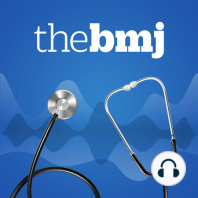14 min listen

Talk evidence covid-19 update - remdesivir redux, the overwhelming volume of research
FromThe BMJ Podcast
Talk evidence covid-19 update - remdesivir redux, the overwhelming volume of research
FromThe BMJ Podcast
ratings:
Length:
31 minutes
Released:
Jun 3, 2020
Format:
Podcast episode
Description
That remdesivir study has finally been published - what does it say and is it as independant as claimed. Also, as the world's focus turned to covid, so have researchers - and they've produced over 15000 papers. How can we sift through the flood of research and know what's any good?
(2.30) Helen Macdonald talks to Elizabeth Loder about the volume of research we're seeing, and why journals and peer reviewers are struggling to check it all.
(8.15) The study on remdesivir has been published - the trial was stopped early, and the primary outcome switched - we talk about how that increases uncertainty over the results, and could actually delay the treatment.
(26.50) We hear from a couple fo readers who wanted to correct us about averages, means, medians.
Reading list:
The US NIH AID study on remdesivir, published 22nd May in the New England Journal of Medicine
Research - preliminary report https://www.nejm.org/doi/full/10.1056/NEJMoa2007764
NEJM - looking at the dose duration https://www.nejm.org/doi/full/10.1056/NEJMoa2015301
Editorial - an important first step https://www.nejm.org/doi/full/10.1056/NEJMe2018715
(2.30) Helen Macdonald talks to Elizabeth Loder about the volume of research we're seeing, and why journals and peer reviewers are struggling to check it all.
(8.15) The study on remdesivir has been published - the trial was stopped early, and the primary outcome switched - we talk about how that increases uncertainty over the results, and could actually delay the treatment.
(26.50) We hear from a couple fo readers who wanted to correct us about averages, means, medians.
Reading list:
The US NIH AID study on remdesivir, published 22nd May in the New England Journal of Medicine
Research - preliminary report https://www.nejm.org/doi/full/10.1056/NEJMoa2007764
NEJM - looking at the dose duration https://www.nejm.org/doi/full/10.1056/NEJMoa2015301
Editorial - an important first step https://www.nejm.org/doi/full/10.1056/NEJMe2018715
Released:
Jun 3, 2020
Format:
Podcast episode
Titles in the series (100)
Suspected heart failure: Mabel Chew, practice editor at the BMJ, talks to Tushar Kotecha, a cardiology specialist registrar at Charing Cross Hospital in London, about when to suspect heart failure, and how to diagnose the condition. by The BMJ Podcast